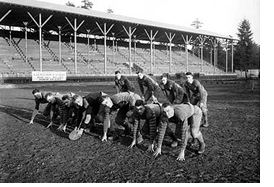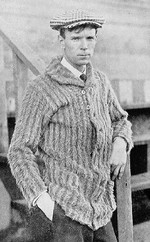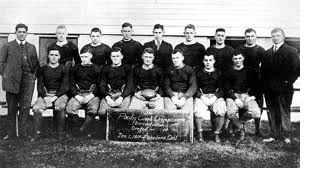 Washington football team, 1916
Washington football team, 1916Dobie is widely remembered as one of the biggest Running Up The Score advocates college football has ever seen. Between 1908 and 1916, his team went 58-0-3. That’s right: He never lost a game in nine seasons.
Before one gets too worked up with awe and wonder at that record, consider that many of those victories were at the expense of various athletic clubs, high schools, and the Bremerton Navy intramural team. Dobie rarely let his team play more than one game away from Montlake every season. (It’s worth noting that the scores of those road games were always significantly closer than the Seattle contests; Dobie was known for his ability to intimidate officials.) Nonetheless, his teams did manage to play the other three “big” NW schools each year, and never lost to them. Although it’s arguably more impressive to beat Oregon 10-7, than something called Whitworth 100-0, as Dobie’s team did in 1913, the record is what it is.
 Gil DobieAfter an unblemished nine year record at UW, it must have stuck in Gil Dobie’s craw that Oregon was being considered for the West Coast slot in the new Tournament of Roses East-West Game, scheduled to be played on New Year’s Day, 1917. The general consensus by early November was that the winner of the UW-UO game, played on November 4 at Oregon’s Kincaid Field, would receive the invite to Pasadena and a game against the University of Pennsylvania.
Gil DobieAfter an unblemished nine year record at UW, it must have stuck in Gil Dobie’s craw that Oregon was being considered for the West Coast slot in the new Tournament of Roses East-West Game, scheduled to be played on New Year’s Day, 1917. The general consensus by early November was that the winner of the UW-UO game, played on November 4 at Oregon’s Kincaid Field, would receive the invite to Pasadena and a game against the University of Pennsylvania. Oregon football team, 1916Star halfback Johnny Parsons had matriculated at Oregon in 1911, but did not play football that year because of a typhoid attack. He suited up in 1912, 1913 and 1914, ran out of cash, took a year off, played for the Multnomah AC (you could do that back then; the NCAA didn’t yet exist), then came back for his fourth season in 1916.
Oregon football team, 1916Star halfback Johnny Parsons had matriculated at Oregon in 1911, but did not play football that year because of a typhoid attack. He suited up in 1912, 1913 and 1914, ran out of cash, took a year off, played for the Multnomah AC (you could do that back then; the NCAA didn’t yet exist), then came back for his fourth season in 1916.Parsons is a good, clean athlete, unable to attend college last year through lack of funds. If he had been at Washington Gil Dobie .. would have grabbed him an $85 or $90 a month job in the courthouse where big Murphy has been located for several years. This lad, Murphy, wanted to enter Oregon … three years ago, but the officials couldn’t offer him better than a $20 position as chauffeur to a hotel elevator … Murphy thereupon wrote to Washington and within a fortnight was drawing down more money every month than half the married men who belong to the union and have seven kids to support.
In sharp contrast, Parsons laid off a year and toiled hard andd faithfully in the mines of Montana to secure the money with which to compete his final year in college… Yet they play Murphy and protest Parsons.
… It is not to be denied that this picayunish habit of always trying to bulldoze the show is what has brought the University of Washingotn athletic policy into such disrepute in the Pacific Northwest. Nearly every time Gilmour Dobie has played Oregon or the Oregon Aggies within the past few years there has been some protest or mud thrown from the other end on the eve of the game.
… fans will recall that Dobie, just prior to one memorable 34-0 walloping plastered on the Aggies, charged [OAC coach] Dolan’s crowd with having chloroform concealed on their persons for use against Purple players.
Still later … Dobie brought his team to Portland to play Oregon and threatened to call the game off because there was sawdust on the field. Last year he cancelled his game with Oregon with no iota of excuse except he saw a soft bird to be plucked in the shape of the University of California novices.”
We believe the intent of the conference was to cut down the years of participation from four to three by elimination of the freshman year. There was no intention to permit athletes to play more years than the old rules permitted. we feel therefore Shiel, Hunt and Miller … are not now eligible. Parsons, an undergraduate, had one year still coming under the old rules… The Oregon faculty feels that when a college athlete runs out of funds he should leave school and suspend his athletics until he can pay his own way. This is what Parsons did. A severe illness in his freshman year used up his funds, kept him out of athletics and made it impossible for him to gradulate in four years. He stuck out what would have been his last year had he not been ill, but then found it necessary to leave school to earn money. This being before the adoption of the non-retroactive rule in question … any attempt to punish him for it is contrary to the ethics of amateur sport.
Now the University of Oregon wishes it clearly understood that the settlement of … eligibility is in the hands of the committee, one member of which is a University of Washington man and the other a representative of the institution not involved in the present game [Dean Cordley, of OAC] … If Washington rejects the decision of the committee on which it has half the representation and Oregon and California none, it should be clearly understood their quarrel is not with Oregon, but with the Pacific Coast conference..”
It wasn’t over yet. Dobie proffered a new charge on Saturday morning, just hours before the game: somehow, his detectives had discovered that Parsons had withdrawn during his last semester at Oregon in 1915, not before, and was by rule ineligible to compete during the 1916 season because of incomplete scholastic work from 1915. The complaint was lodged at a joint meeting of the PCC arbitration board and the UO faculty athletic committee. On investigation, the committee declared the charge true, and ruled Parsons ineligible.
The committee went to Kincaid Field to declare Parsons out for the game, but found the teams had already lined up to play. Feeling that declaring Parsons ineligible would incite a riot among the local partisans, the UW representative withdrew his protest, and the game went on with Parsons starting at right halfback. The story of the successful protest wasn’t announced until the day after the game.
**
The game itself played out, in horrible rainy conditions, to a 0-0 tie.
From the Seattle Times play-by-play:
Fourth period: Raining hard. Time out. Both teams wash mud from eyes. All players heavily coated with mud.
**
Having secured its ace in the hole — an ineligible Oregon player in its game — UW made its case to the Tournament of Roses committee that it was a more worthy opponent for Pennsylvania, based on its overall record, the fact that the Sundodgers had beaten Cal *twice* — 13-3 and 14-7 — and that Oregon had scurrilously played an ineligible athlete… even though Washington’s representative had agreed to let Parsons play in the game.
Oregon partisans, oddly, countered that since the game had ended in a 0-0 tie, that no advantage was gained by playing Parsons, and thus the choice between the teams should stand on Oregon’s superior effort against Cal (a 39-14 victory).
The Pasadena committee weighed the above evidence against the economic realities of the time: A train ticket from Eugene to Pasadena was significantly less costly than a ticket from Seattle; since the agreement was that the sponsors would pick up the train fare, the economic scales tipped in favor of the Ducks.
Oregon got the bid to the second Tournament of Roses game. The Huskies stayed home.
**
Epilogue: Dobie was fired as head football coach a few days later, following an incident involving tackle Bill Grimm, who was caught cheating on a test and suspended; the UW position was that he “failed to instill character in his charges.” Apples don’t rot far from the tree, it seems.